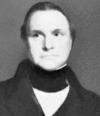- Babbage, Charles
-
born Dec. 26, 1791, London, Eng.died Oct. 18, 1871, LondonBritish mathematician and inventor.Educated at Cambridge University, he devoted himself from about 1812 to devising machines capable of calculating mathematical tables. His first small calculator could perform certain computations to eight decimals. In 1823 he obtained government support for the design of a projected machine with a 20-decimal capacity. In the 1830s he developed plans for the so-called Analytical Engine, capable of performing any arithmetical operation on the basis of instructions from punched cards, a memory unit in which to store numbers, sequential control, and most of the other basic elements of the present-day computer. The forerunner of the modern digital computer, the Analytical Engine was never completed. In 1991 British scientists built Difference Engine No. 2 (accurate to 31 digits) to Babbage's specifications. His other contributions included establishing the modern postal system in England, compiling the first reliable actuarial tables, and inventing the locomotive cowcatcher.
 Charles Babbage, detail of an oil painting by Samuel Lawrence, 1845; in the National Portrait ...Courtesy of the National Portrait Gallery, London
Charles Babbage, detail of an oil painting by Samuel Lawrence, 1845; in the National Portrait ...Courtesy of the National Portrait Gallery, London* * *
▪ British inventor and mathematicianborn December 26, 1791, London, Englanddied October 18, 1871, LondonEnglish mathematician and inventor who is credited with having conceived the first automatic digital (digital computer) computer.In 1812 Babbage helped found the Analytical Society, whose object was to introduce developments from the European continent into English mathematics. In 1816 he was elected a fellow of the Royal Society of London. He was instrumental in founding the Royal Astronomical (1820) and Statistical (1834) societies.The idea of mechanically calculating mathematical tables first came to Babbage in 1812 or 1813. Later he made a small calculator that could perform certain mathematical computations to eight decimals. Then in 1823 he obtained government support for the design of a projected machine with a 20-decimal capacity. Its construction required the development of mechanical engineering techniques, to which Babbage of necessity devoted himself. In the meantime (1828–39) he served as Lucasian Professor of Mathematics at the University of Cambridge.During the mid-1830s Babbage developed plans for the Analytical Engine, the forerunner of the modern digital computer. In this device he envisioned the capability of performing any arithmetical operation on the basis of instructions from punched cards, a memory unit in which to store numbers, sequential control, and most of the other basic elements of the present-day computer. The Analytical Engine, however, was never completed. Babbage's design was forgotten until his unpublished notebooks were discovered in 1937. In 1991 British scientists built Difference Engine No. 2—accurate to 31 digits—to Babbage's specifications.Babbage made notable contributions in other areas as well. He assisted in establishing the modern postal system in England and compiled the first reliable actuarial tables. He also invented a type of speedometer and the locomotive cowcatcher.* * *
Universalium. 2010.
